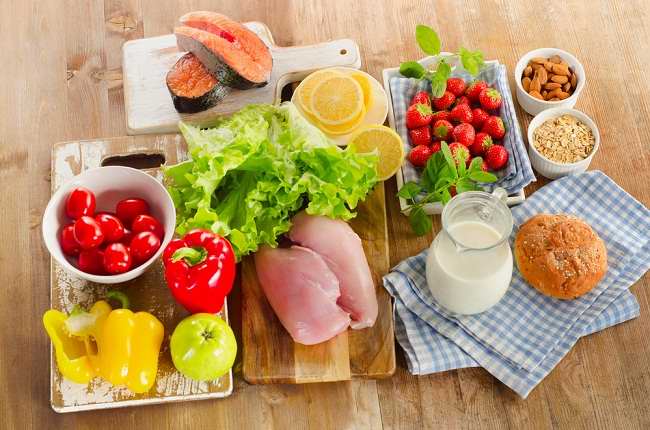Check the Healthy Diet Menu for Morning, Afternoon and Evening Dining
A healthy diet is a list of balanced nutritious foods with levels that are adjusted by the body's needs every day. This menu is not only for those who want to take care of their bodies, but for everyone who wants to live healthy.
To get the maximum benefit, your healthy diet menu must contain a variety of essential nutrients that are needed by the body. Essential nutrition is a nutrient that cannot be produced by the body itself, so it must be fulfilled by eating foods that contain these nutrients.
Essential nutrients that must be on the menu of a healthy diet are divided into two categories, namely macronutrients and micronutrients. Macronutrients are nutrients that the body needs in large quantities to provide energy to the body. Macronutrients consist of carbohydrates, proteins, and fats. While micronutrients are nutrients that support the body's performance, and are consumed only in small amounts. Which includes micronutrients are vitamins and minerals.
The Importance of Nutrition that Must Be in the Healthy Diet Menu
Every day, the body needs to be given an intake consisting of carbohydrates, proteins, fats, various vitamins and minerals, and water to support its performance.
Why are these substances so important for the body? This is the explanation:
Carbohydrate
The body's main energy source comes from carbohydrates. The brain can also work optimally if you get enough of this intake. Examples of good carbohydrates are foods made from whole grains, vegetables, fruits, and nuts. Carbohydrates that you must limit consumption include white rice, packaged fruit drinks, soft drinks, potato chips, sweets, and sweet cakes.
Protein
This substance is a source of energy for the body. Adequate protein intake is very important for the growth of body tissues, helps maintain a healthy body, and helps the body heal itself. Protein can be found in eggs, fish, meat, soybeans, poultry, cheese, and nuts.
Fat
You might avoid if there are foods that contain fat. However, fatty foods do not always have to be avoided. The body also needs fat intake to maintain cell structure and help the body's tissues function properly, maintain the immune system, and help the body absorb vitamins.
Even so, you must know the limits of eating fatty foods so as not to cause weight gain, and not increase your risk of heart disease and other health problems. Choose good fatty foods, such as fish, lean poultry, oil from vegetables (olive oil). Limit fatty foods like pizza, burgers, sausages and fast food, because they are high in saturated fats.
Vitamins and minerals
Both of these substances can help the body's organs carry out their functions. Vitamins needed by the body are vitamins A, B, C, D, E, and K. While minerals needed by the body include calcium, iron, potassium, zinc, and selenium.
Water
Liquid does not have nutrients, but water can hydrate the body. About half of your body's composition consists of water. Apart from drinking water, you can get liquids from foods such as fruit and vegetables.
You can get all the ingredients above when running a healthy diet.
Don't Forget to Meet Your Daily Calorie Needs
In addition to paying attention to its nutritional value, foods that must be on a healthy diet must also be adjusted to your daily calorie needs. Each individual has different calorie needs. However, the average adult needs 2000 calories per day. Consult a nutritionist so that you can find out the number of calories according to your body condition, including age, gender, daily physical activity, metabolism, height and weight, and certain health conditions.
Eating based on calorie needs is very important, especially for those of you who want to lose or maintain weight. Calories can make the body energize. However, consuming calories more than your body needs can make it accumulate in the body and stored as fat.
Example of a Healthy 2000 Calorie Diet Menu
The following is a healthy diet menu of 2000 calories that you can apply for breakfast, lunch and dinner. Even though it's called a healthy diet menu, your tongue can still be spoiled by this variety of foods.
Breakfast
You can fill your stomach by eating a bowl of cereal with a spread of raisins and fat-free milk. After that, a small banana and one piece of bread from whole grains with a spread of margarine and jam can be eaten.
Other healthy breakfast choices are oatmeal mixed with raisins and cooked with margarine. For drinks, you can drink orange juice (250 ml) and nonfat milk (120 ml).
Lunch
You can make sandwiches consisting of bread from whole grains, chicken, lettuce, sauteed mushrooms, and mustard sauce. End your lunch with 200 grams of boiled potatoes.
Dinner
Capcay tofu with vegetables and peppers, a bowl of brown rice and one cup of lemon tea about 250 ml.
Other variations of dinner you can try are 140 grams of grilled salmon sprinkled with celery, onions, and bread crumbs. Serve with rice, 125 grams of steamed broccoli and almonds. End dinner with nonfat milk (250 ml).
Snack
Examples of snacks that you can consume every day consist of 250 grams of low-fat yogurt mixed with fruits.
There may be times when you are bored with healthy foods and want to eat foods with high fat and calorie levels, such as fast food. You can consume it on certain days, for example every Sunday. However, the next day, you must consume foods that are low in calories to avoid the buildup of calories in the body. Applying a healthy diet menu will be more helpful if you exercise regularly, at least 30 minutes per day, in order to maintain fitness.

0 Response to "Check the Healthy Diet Menu for Morning, Afternoon and Evening Dining"
Post a Comment